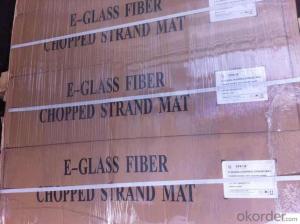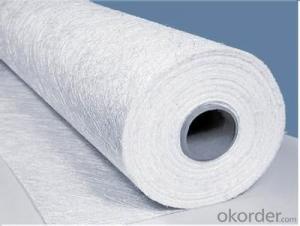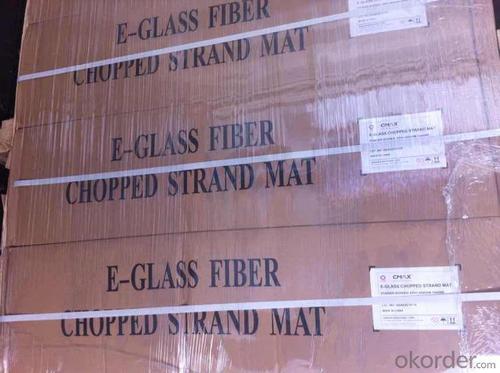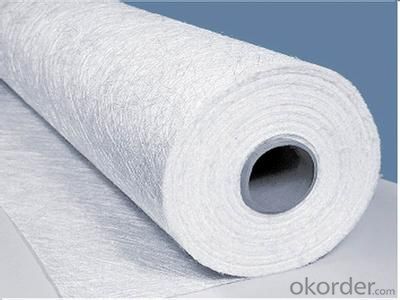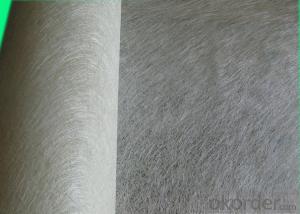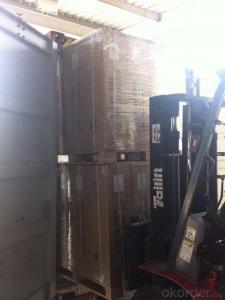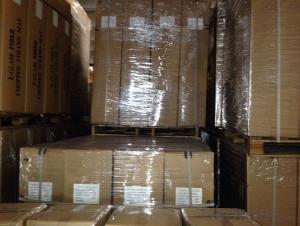Fiberglass Mat Tissue E Glass Emulsion Chopped Strand Mat for Filament Winding
- Loading Port:
- Shanghai
- Payment Terms:
- TT OR LC
- Min Order Qty:
- 10000 kg
- Supply Capability:
- 200000 kg/month
OKorder Service Pledge
OKorder Financial Service
You Might Also Like
1.Brief Introduction E-glass emulsion chopped strand mat for filament winding is made of randomly distributed chopped strands held tighter by a emulsion binder. It is compatible with UP, VE, EP resins.
Additional demands on wet-out and decomposition time may be available upon request.
2.Product Features
Fast breakdown in styrene
High tensile strength, allowing for use in hand lay-up process to produce large-area parts
Superior acid corrosion resistance
3.Product Specifications
Property | Area Weight | Moisture Content | Size Content | Breakage Strength | Width |
(%) | (%) | (%) | (N) | (mm) | |
Mathods | IS03374 | ISO3344 | ISO1887 | ISO3342 | |
EMC80E | ±7.5 | ≤0.20 | 8-12 | ≥40 | 50-3300 |
EMC100E | ≥40 | ||||
EMC120E | ≥50 | ||||
EMC150E | 4-8 | ≥50 | |||
EMC180E | ≥60 | ||||
EMC200E | ≥60 | ||||
EMC225E | ≥60 | ||||
EMC300E | 3-4 | ≥90 | |||
EMC450E | ≥120 | ||||
EMC600E | ≥150 | ||||
EMC900E | ≥200 |
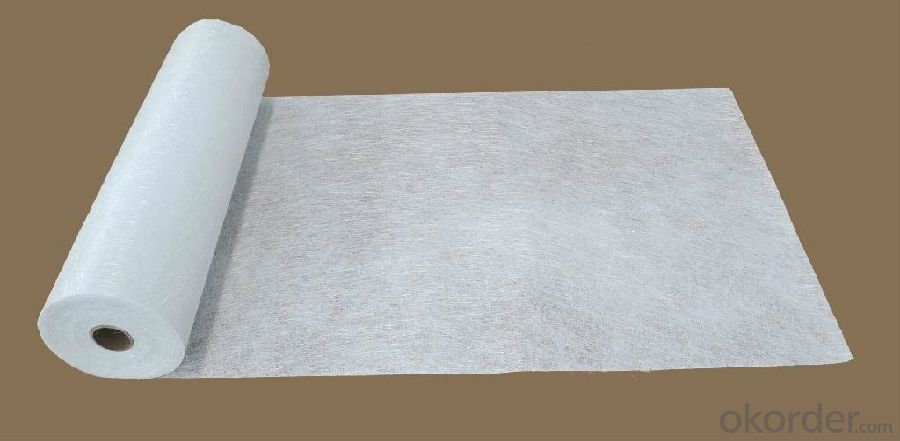 4.FAQ
4.FAQ
Packaging:
Each Chopped Strand Mat is wound onto a paper tube which has an inside diameter of 76mm and the mat roll has a diameter of 275mm. The mat roll is wrapped up with plastic film,and then packed in a cardboard box or wrapped up with kraft paper. The rolls can be vertically or horizontally placed. For transportation, the rolls can be loaded into a cantainer directly or on pallets.
Delivery and Payment Term
The products will be ready in 20 days after getting the advance payment or acceptable original l/c.The payment term can be 30% t/t in advance,70% t/t againest b/l copy or l/c.
- Q: What is the cost of fiberglass mat tissue?
- The cost of fiberglass mat tissue can vary depending on various factors such as the brand, quality, quantity, and location. On average, fiberglass mat tissue can range from $0.50 to $2 per square foot. However, it is important to note that prices may differ based on the specific needs of the project and the supplier or retailer from which it is purchased. It is recommended to research and compare prices from different sources to find the most suitable and cost-effective option for your requirements.
- Q: Does fiberglass mat tissue provide good acoustical performance?
- Yes, fiberglass mat tissue does provide good acoustical performance. It has excellent sound absorption properties due to its fibrous composition, which helps reduce echo and improve overall sound quality in a given space.
- Q: Does fiberglass mat tissue require any special surface bonding agents?
- Special surface bonding agents are necessary for fiberglass mat tissue. It is commonly used as a reinforcement material in industries like construction, automotive, and aerospace. To achieve a strong bond between the fiberglass mat tissue and the substrate, a suitable bonding agent or adhesive is needed. The bonding agent plays a crucial role in creating a durable and robust bond between the fiberglass mat tissue and the applied surface. It enhances the overall strength, integrity, and performance of the composite material. Additionally, it prevents delamination or separation of the fiberglass mat tissue from the substrate. The type of bonding agent required may vary depending on the specific application and the substrate's properties. Typically, epoxy-based bonding agents are widely used for bonding fiberglass mat tissue due to their excellent bonding strength, chemical resistance, and durability. Before applying the bonding agent, it is essential to thoroughly clean the surface and remove any contaminants that may affect adhesion. The bonding agent can then be applied using appropriate techniques such as brushing, spraying, or rolling. In conclusion, special surface bonding agents are necessary for fiberglass mat tissue to ensure proper adhesion and enhance the performance of the composite material. The choice of bonding agent depends on the specific application and substrate properties. Adequate surface preparation is also crucial for achieving a strong and durable bond.
- Q: Can fiberglass mat tissue be used in high-temperature applications?
- No, fiberglass mat tissue cannot be used in high-temperature applications.
- Q: What is the expected lifespan of fiberglass mat tissue in chemical storage applications?
- The lifespan of fiberglass mat tissue in chemical storage applications can vary depending on several factors. These factors include the type and concentration of chemicals being stored, as well as the specific conditions of the storage environment. Fiberglass mat tissue is widely used in chemical storage applications because it has excellent corrosion resistance and provides structural reinforcement. However, it is important to note that fiberglass mat tissue is not completely immune to chemical degradation. In general, fiberglass mat tissue can withstand a wide range of chemicals and has a relatively long lifespan when properly maintained. It is typically designed to last for several years, and some manufacturers offer warranties ranging from 10 to 20 years. However, aggressive chemicals or extreme storage conditions can accelerate the degradation of fiberglass mat tissue. Chemicals with high acidity or alkalinity, extreme temperatures, or prolonged exposure to UV radiation can potentially reduce the lifespan of the material. To ensure the maximum lifespan of fiberglass mat tissue in chemical storage applications, it is crucial to carefully select the appropriate type of fiberglass mat tissue that is specifically designed for the intended chemicals and storage conditions. Regular inspections, maintenance, and proper handling of the chemicals can also help prolong the lifespan of the material. Ultimately, it is advisable to consult with the manufacturer or a qualified engineer to determine the expected lifespan of fiberglass mat tissue in a specific chemical storage application. They can provide more accurate information based on the specific circumstances.
- Q: Can fiberglass mat tissue be used for making electrical enclosures?
- No, fiberglass mat tissue cannot be used for making electrical enclosures. Electrical enclosures require materials that have high electrical insulation properties, such as non-conductive plastics or metals, to ensure safety and prevent electrical hazards.
- Q: Can fiberglass mat tissue be used for insulation in cleanrooms?
- Fiberglass mat tissue can indeed be used for insulation in cleanrooms. It offers several advantages that make it a suitable choice for such applications. Firstly, fiberglass mat tissue has excellent thermal insulation properties, which helps to maintain the desired temperature and prevent heat transfer in cleanrooms. This is crucial in environments where temperature control is essential for processes or equipment. Additionally, fiberglass mat tissue has good acoustic insulation capabilities, which can help in reducing noise levels within cleanrooms. This is particularly important in cleanrooms where sensitive equipment or experiments are conducted, as minimizing noise disturbances can ensure accurate and reliable results. Furthermore, fiberglass mat tissue is non-combustible, meaning it does not catch fire easily. This adds an extra layer of safety in cleanrooms where flammable materials or volatile substances may be present. The non-combustible nature of fiberglass mat tissue also contributes to its overall durability and longevity. Lastly, fiberglass mat tissue is resistant to moisture, making it suitable for cleanrooms where humidity control is crucial. It does not absorb moisture, preventing the growth of mold or mildew, which can be detrimental to cleanroom environments. Overall, fiberglass mat tissue is a viable option for insulation in cleanrooms due to its thermal and acoustic insulation properties, non-combustible nature, and resistance to moisture. Its use can contribute to maintaining the desired conditions within cleanrooms and ensuring the integrity of processes and equipment.
- Q: How is fiberglass mat tissue used in the automotive industry?
- Fiberglass mat tissue is extensively used in the automotive industry for various purposes. It is a versatile material that offers numerous benefits, making it an ideal choice for several applications. One of the primary uses of fiberglass mat tissue in the automotive industry is for reinforcing composite materials. It is commonly used as a reinforcement layer in the manufacturing of parts such as car panels, hoods, roofs, and doors. The fiberglass mat tissue enhances the structural integrity of these components, making them more robust and resistant to impact and external forces. This reinforcement property helps in improving the overall safety of the vehicle. Additionally, fiberglass mat tissue is also used in the automotive industry for sound insulation purposes. The material has excellent sound absorption properties, which helps in reducing noise and vibrations within the vehicle. By installing fiberglass mat tissue in various areas such as the floor, doors, and roof, automakers can significantly enhance the overall acoustic comfort of the vehicle, providing a quieter and more enjoyable driving experience. Furthermore, fiberglass mat tissue is also utilized in the automotive industry for thermal insulation. The material acts as a barrier against heat transfer, helping to regulate the temperature inside the vehicle. By incorporating fiberglass mat tissue in areas such as the engine compartment, exhaust system, and undercarriage, automakers can effectively insulate the vehicle from excessive heat, preventing overheating and ensuring optimal performance. In summary, fiberglass mat tissue is extensively used in the automotive industry for reinforcement, sound insulation, and thermal insulation purposes. Its versatile properties make it an indispensable material in the manufacturing of vehicles, contributing to improved safety, comfort, and performance.
- Q: Is fiberglass mat tissue suitable for aerospace repairs?
- Indeed, fiberglass mat tissue proves to be a fitting choice for aerospace repairs. This lightweight and pliable material can be effortlessly shaped and applied to various surfaces. Its exceptional strength-to-weight ratio makes it particularly suitable for circumstances where weight plays a crucial role, such as aerospace repairs. Aerospace repairs frequently employ fiberglass mat tissue to fortify areas of the aircraft structure that have been compromised or weakened. By doing so, it ensures outstanding structural integrity and longevity, enabling the repaired region to endure the demanding conditions and stresses encountered during flight. Moreover, fiberglass mat tissue demonstrates compatibility with various resin systems, including epoxy and polyester. This allows for efficient bonding, guaranteeing a dependable repair. Its versatility permits it to be utilized in both interior and exterior repairs, such as patching up composite panels, reinforcing wing sections, or rectifying damaged fuselage areas. Beyond its mechanical attributes, fiberglass mat tissue also exhibits exceptional resistance to corrosion, moisture, and chemicals. This enhances the durability of the repaired components, a particularly important feature in aerospace applications where the aircraft is frequently exposed to harsh environmental conditions. All in all, fiberglass mat tissue emerges as a suitable material for aerospace repairs due to its lightweight nature, impressive strength, versatility, and resistance to environmental factors. Its use in the aerospace industry has been firmly established, and it remains a dependable choice for repairing and reinforcing critical aircraft components.
- Q: Is fiberglass mat tissue suitable for insulation in pharmaceutical plants?
- Fiberglass mat tissue is not typically suitable for insulation in pharmaceutical plants. Pharmaceutical plants require insulation materials that meet specific requirements, such as being non-porous, non-shedding, and resistant to moisture and chemicals. Fiberglass mat tissue is a porous material and may shed fibers, which can contaminate the pharmaceutical production environment. Additionally, it may not provide adequate resistance to moisture and chemicals, which are common in pharmaceutical plants. It is recommended to use insulation materials that are specifically designed and certified for pharmaceutical applications to ensure they meet the necessary standards and regulations for insulation in these sensitive environments.
Send your message to us
Fiberglass Mat Tissue E Glass Emulsion Chopped Strand Mat for Filament Winding
- Loading Port:
- Shanghai
- Payment Terms:
- TT OR LC
- Min Order Qty:
- 10000 kg
- Supply Capability:
- 200000 kg/month
OKorder Service Pledge
OKorder Financial Service
Similar products
Hot products
Hot Searches
Related keywords
